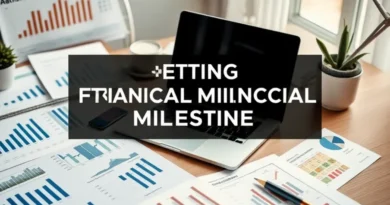Small Money Moves That Lead to Big Growth
In a world where financial security often feels out of reach, the idea of small, manageable changes can seem almost too simplistic. Yet, small money moves can significantly affect your financial growth. Whether you’re trying to pay off debt, save for a fabulous vacation, or just build a nest egg, every little bit helps. In this post, we will explore several small money moves that, over time, can result in substantial growth, both in your finances and in your overall well-being.
Let’s first understand that small changes are often easier to manage than radical shifts in financial behavior. Approaching financial growth incrementally can make it feel less daunting and more achievable. Here are some effective small moves you can begin implementing today:
1. Automate Your Savings
One of the simplest yet most effective ways to ensure you save regularly is to set up an automated savings plan. This could be as easy as having a certain amount transferred from your checking account to your savings account every month. Treating your savings like a non-negotiable expense ensures you prioritize it just as much as you would your rent or groceries. Over time, those small deposits can lead to significant savings!
2. Track Your Spending
Monitoring your expenses is crucial for understanding where your money goes. Many people aren’t aware of how much they’re spending on small, discretionary items until they begin tracking their spending. Use apps or simple spreadsheets to keep an eye on your monthly expenditures. Once you identify areas where you can cut back, you can redirect those funds towards savings or investments.
3. Embrace Budgeting
Creating a budget can sound boring, but it’s a powerful tool for managing your finances. The good news is you don’t have to stick to a rigid plan. Instead, use a framework that works for you—whether that’s the “50/30/20” rule (50% needs, 30% wants, 20% savings) or other methods. Once you develop a budgeting habit, you’ll likely discover that small adjustments can lead to significant results over time.
4. Cut Unnecessary Subscriptions
In today’s world of endless subscriptions for everything from streaming services to gym memberships, it’s all too easy to forget what you’re paying for. Review your subscriptions regularly and cut out those you no longer use or need. Reducing even a few monthly subscriptions can free up funds for savings or investments that compound over time.
5. Invest in Yourself
While this might not seem like a financial move in the traditional sense, investing in yourself can lead to exponential growth. Take courses that enhance your skills, or consider attending workshops and networking events in your industry. While this might require some initial investment, the payoff can be huge—whether that means a promotion, career switch, or even starting your own business!
6. Start Investing, Even if It’s Small
Thanks to technology, you can start investing with minimal capital. Apps allow you to invest spare change by rounding up your purchases and automating investments. These small amounts will grow slowly but significantly over time thanks to compound interest. The earlier you start investing, even in small amounts, the more you stand to gain in the long run.
7. Set Short-Term Goals
Having something to work toward can motivate you to stay financially disciplined. Set achievable short-term goals—like saving for a vacation or paying off a credit card within a few months. Celebrate those wins! They’ll build your confidence and can keep you engaged in your financial journey.
8. Be Mindful About Meal Planning
Food expenses can take a big chunk of your budget, but meal planning can help curb those costs significantly. By planning meals and creating shopping lists, you’ll not only save money but also reduce food waste. This small habit can have a lasting positive effect on both your financial health and your well-being.
9. Analyze and Refinance Your Debt
If you have student loans, credit card debt, or a mortgage, consider analyzing your debt to see if refinancing options are available. Even a slightly lower interest rate can lead to significant savings over the life of the loan. Additionally, explore loan consolidation or balance transfer offers if the terms are favorable.
10. Build an Emergency Fund
An emergency fund is a buffer against life’s unexpected events, helping reduce stress and financial strain. Start small; aim for three to six months’ worth of living expenses. Gradually work your way toward this goal, and enjoy the peace of mind that comes with financial security.
In closing, small money moves can lead to big growth over time. While the initial changes may look insignificant, their potential to compound into substantial financial success cannot be understated. The key is consistency and a commitment to your long-term financial health. Start implementing these small strategies today and watch your financial future flourish!




